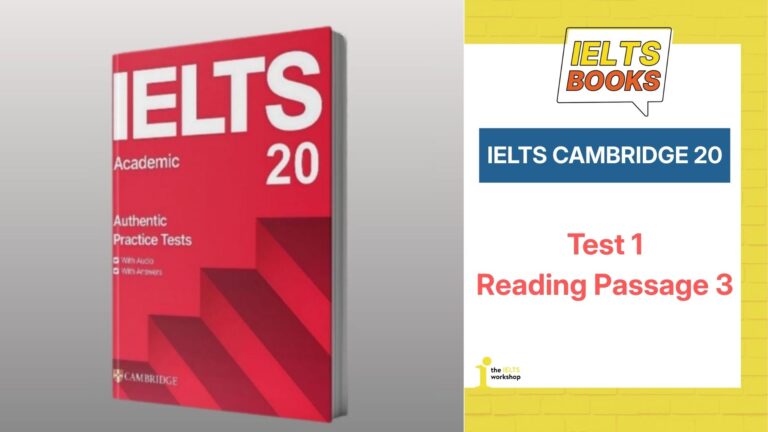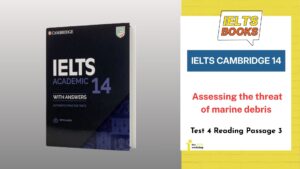Hy vọng rằng phần đáp án và phân tích chi tiết trong bài viết đã giúp bạn hiểu rõ hơn về cách làm bài hiệu quả trong IELTS Cambridge 20 Test 1 Reading Passage 3. Việc luyện tập kỹ lưỡng từng câu hỏi không chỉ giúp cải thiện kỹ năng mà còn nâng cao khả năng tư duy phản biện. Hãy tiếp tục ôn luyện đều đặn và rút kinh nghiệm từ mỗi lần làm bài để từng bước tiến gần hơn đến mục tiêu của bạn.
Đáp án IELTS Cambridge 20 Test 1 Reading Passage 3
| Câu hỏi | Đáp án / Từ khóa |
|---|---|
| 27 | C |
| 28 | A |
| 29 | D |
| 30 | C |
| 31 | B |
| 32 | G |
| 33 | F |
| 34 | E |
| 35 | D |
| 36 | YES |
| 37 | NOT GIVEN |
| 38 | NO |
| 39 | YES |
| 40 | YES |
Phân tích chi tiết IELTS Cambridge 20 Test 1 Reading Passage 3
Question 27. C
Câu hỏi: In the first paragraph, the writer introduces the topic of the text by…. (Trong đoạn đầu tiên, tác giả giới thiệu chủ đề bằng cách….)
Vị trí: Đoạn 1.
Transcript: Some of the most important decisions of our lives occur while we’re feeling stressed and anxious.
Phân tích: Tác giả bắt đầu bài viết bằng cách nêu lên một thách thức mà ai cũng từng đối mặt – việc phải đưa ra quyết định quan trọng trong lúc căng thẳng. Đây là một vấn đề phổ biến, không giới hạn cho một nhóm đối tượng cụ thể → đáp án đúng là C.
Question 28. A
Câu hỏi: What point does the writer make about firefighters in the second paragraph? (Tác giả đưa ra quan điểm gì về lính cứu hỏa trong đoạn 2?)
Vị trí: Đoạn 2.
Transcript: These ups and downs presented the perfect setting for an experiment on how people’s ability to use information changes when they feel under pressure.
Phân tích: Sự thay đổi giữa các ngày bận rộn và thư giãn khiến lính cứu hỏa trở thành đối tượng lý tưởng để nghiên cứu. Không có chi tiết nào về chiến lược, tính cách hay so sánh với nghề khác. → đáp án đúng là A.
Question 29. D
Câu hỏi: What is the writer doing in the fourth paragraph? (Tác giả đang làm gì trong đoạn thứ tư?)
Vị trí: Đoạn 4.
Transcript: We asked the firefighters to estimate their likelihood of experiencing 40 different adverse events in their life …
Phân tích: Đoạn này mô tả quá trình thực nghiệm, cách lấy dữ liệu và xử lý dữ liệu, rõ ràng là đang trình bày phương pháp nghiên cứu → đáp án đúng là D.
Question 30. C
Câu hỏi: In the seventh paragraph, the writer describes a mechanism in the brain which…. (Trong đoạn 7, tác giả mô tả một cơ chế trong não bộ mà…)
Vị trí: Đoạn 7.
Transcript: …a physiological change is triggered that causes us to take in warnings and focus on what might go wrong…in response to unexpected warning signs, such as faces expressing fear.
Phân tích: Cơ chế này giúp não bộ tăng độ nhạy với các dấu hiệu cảnh báo bên ngoài như nét mặt lo sợ → đáp án đúng là C.
Question 31. B
Câu hỏi: At times when they were relaxed, the firefighters usually…. (Khi cảm thấy thư giãn, lính cứu hỏa thường…)
Vị trí: Đoạn 5.
Transcript: People are normally quite optimistic – they will ignore bad news and embrace the good. This is what happened when the firefighters were relaxed.
Phân tích: Khi thư giãn, họ ít để ý đến tin xấu → đáp án đúng là B.
Question 32. G
Câu hỏi: The researchers noted that when the firefighters were stressed, they…. (Các nhà nghiên cứu ghi nhận rằng khi lính cứu hỏa bị căng thẳng, họ…)
Vị trí: Đoạn 5.
Transcript: They became hyper-vigilant to bad news… and altered their beliefs in response.
Phân tích: Khi căng thẳng, lính cứu hỏa trở nên nhạy cảm quá mức với tin xấu và điều chỉnh niềm tin theo hướng tiêu cực → đáp án đúng là G.
Question 33. F
Câu hỏi: When the firefighters were told good news, they always…. (Khi nhận tin tốt, lính cứu hỏa luôn….)
Vị trí: Đoạn 5.
Transcript: In contrast, stress didn’t change how they responded to good news.
Phân tích: Dù có căng thẳng hay không, họ đều phản ứng giống nhau với tin tốt → đáp án đúng là F.
Question 34. E
Câu hỏi: The students’ cortisol levels and heart rates were affected when the researchers…. (Mức cortisol và nhịp tim của sinh viên bị ảnh hưởng khi các nhà nghiên cứu….)
Vị trí: Đoạn 6.
Transcript: …students who were told they had to give a surprise public speech… their cortisol levels spiked, their heart rates went up.
Phân tích: Tình huống gây căng thẳng làm thay đổi sinh lý học → đáp án đúng là E.
Question 35. D
Câu hỏi: In both experiments, negative information was processed better when the subjects…. (Ở cả hai thí nghiệm, thông tin tiêu cực được xử lý tốt hơn khi đối tượng….)
Vị trí: Đoạn 6.
Transcript: They suddenly became better at processing unrelated, yet alarming, information…
Phân tích: Kết quả cho thấy khả năng xử lý tin tiêu cực tăng lên khi đang căng thẳng → đáp án đúng là D.
Question 36. YES
Câu hỏi: The tone of the content we post on social media tends to reflect the nature of the posts in our feeds.
(Giọng điệu của nội dung chúng ta đăng trên mạng thường phản ánh tính chất các bài đăng trong bảng tin.)
Vị trí: Đoạn 9.
Transcript: …we are more likely to post uplifting messages ourselves. If we observe negative posts… we will in turn create more negative posts.
Phân tích: Chúng ta bị ảnh hưởng bởi nội dung tiếp nhận và phản ánh lại khi đăng bài → đáp án đúng là YES.
Question 37. NOT GIVEN
Câu hỏi: Phones have a greater impact on our stress levels than other electronic media devices. (Điện thoại ảnh hưởng đến mức độ căng thẳng của chúng ta nhiều hơn các thiết bị điện tử khác.)
Vị trí: Đoạn 10.
Transcript: Repeatedly checking your phone, for example, is related to stress.
Phân tích: Chỉ đề cập đến điện thoại riêng lẻ, không có so sánh với thiết bị điện tử khác → đáp án đúng là NOT GIVEN.
Question 38. NO
Câu hỏi: The more we read about a stressful public event on social media, the less able we are to take the information in. (Càng đọc nhiều về sự kiện công cộng gây căng thẳng, chúng ta càng kém tiếp nhận thông tin.)
Vị trí: Đoạn 11.
Transcript: Stress is triggered…which temporarily enhances the likelihood that people will take in negative reports.
Phân tích: Căng thẳng làm khả năng tiếp nhận tin tiêu cực tăng lên chứ không giảm → đáp án đúng là NO.
Question 39. YES
Câu hỏi: Stress created by social media posts can lead us to take necessary precautions. (Căng thẳng do bài đăng mạng xã hội có thể khiến ta thực hiện biện pháp phòng ngừa không cần thiết.)
Vị trí: Đoạn 11.
Transcript: Trips are cancelled… stocks are sold…
Phân tích: Những phản ứng này là biện pháp phòng ngừa không cần thiết do căng thẳng từ thông tin mạng → đáp án đúng là YES.
Question 40. YES
Câu hỏi: Our tendency to be affected by other people’s moods can be used in a positive way. (Xu hướng bị ảnh hưởng bởi cảm xúc người khác có thể dùng theo hướng tích cực.)
Phân tích: Cảm xúc tích cực cũng lây lan, giúp thúc đẩy hành động mang tính xây dựng → đáp án đúng là YES.
Vị trí: Đoạn 12.
Transcript: …positive emotions…are powerful in inducing people to act to find solutions…
Dịch chi tiết IELTS Cambridge 20 Test 1 Reading Passage 3
How stress affects our judgement
1. Some of the most important decisions of our lives occur while we’re feeling stressed and anxious. From medical decisions to financial and professional ones, we are all sometimes required to weigh up information under stressful conditions. But do we become better or worse at processing and using information under such circumstances?
(Một số quyết định quan trọng nhất trong cuộc đời chúng ta diễn ra khi ta đang cảm thấy căng thẳng và lo lắng. Từ những quyết định y tế đến tài chính và công việc, tất cả chúng ta đôi khi phải đánh giá thông tin trong điều kiện áp lực. Nhưng liệu trong những tình huống như vậy, chúng ta trở nên giỏi hơn hay tệ hơn trong việc xử lý và sử dụng thông tin?)
Từ vựng cần nhớ:
- weigh up: cân nhắc, đánh giá
- circumstances: hoàn cảnh, tình huống
- anxious: lo lắng, bồn chồn
2. My colleague and I, both neuroscientists, wanted to investigate how the mind operates under stress, so we visited some local fire stations. Firefighters’ workdays vary quite a bit. Some are pretty relaxed; they’ll spend their time washing the truck, cleaning equipment, cooking meals and reading. Other days can be hectic, with numerous life-threatening incidents to attend to; they’ll enter burning homes to rescue trapped residents, and assist with medical emergencies. These ups and downs presented the perfect setting for an experiment on how people’s ability to use information changes when they feel under pressure.
(Đồng nghiệp của tôi và tôi, cả hai đều là nhà thần kinh học, muốn nghiên cứu cách bộ não hoạt động khi chịu áp lực, vì vậy chúng tôi đến một số trạm cứu hỏa địa phương. Ngày làm việc của lính cứu hỏa rất đa dạng. Có ngày khá thoải mái; họ sẽ dành thời gian rửa xe, vệ sinh thiết bị, nấu ăn và đọc sách. Nhưng cũng có những ngày vô cùng bận rộn, với nhiều sự cố đe dọa tính mạng; họ phải vào nhà đang cháy để cứu người bị mắc kẹt và hỗ trợ trong các tình huống y tế khẩn cấp. Sự thăng trầm này là điều kiện hoàn hảo cho một thí nghiệm về việc khả năng xử lý thông tin của con người thay đổi thế nào khi họ bị căng thẳng.)
Từ vựng cần nhớ:
- hectic: náo nhiệt, bận rộn
- incidents: sự cố, biến cố
- under pressure: dưới áp lực
3. We found that perceived threat acted as a trigger for a stress reaction that made the task of processing information easier for the firefighters – but only as long as it conveyed bad news.
(Chúng tôi phát hiện ra rằng mối đe dọa cảm nhận được đóng vai trò như một tác nhân kích hoạt phản ứng căng thẳng, khiến cho việc xử lý thông tin trở nên dễ dàng hơn với lính cứu hỏa – nhưng chỉ khi thông tin đó mang tính tiêu cực.)
Từ vựng cần nhớ:
- perceived threat: mối đe dọa được cảm nhận
- trigger: tác nhân kích hoạt
- convey: truyền tải, mang theo (thông tin)
4. This is how we arrived at these results. We asked the firefighters to estimate their likelihood of experiencing 40 different adverse events in their life, such as being involved in an accident or becoming a victim of card fraud. We then gave them either good news (that their likelihood of experiencing these events was lower than they’d thought) or bad news (that it was higher) and asked them to provide new estimates.
(Đây là cách chúng tôi đi đến những kết quả đó. Chúng tôi yêu cầu các lính cứu hỏa ước tính khả năng họ sẽ gặp phải 40 sự kiện bất lợi khác nhau trong cuộc sống, chẳng hạn như bị tai nạn hoặc trở thành nạn nhân của gian lận thẻ. Sau đó, chúng tôi đưa ra cho họ tin tốt (rằng khả năng xảy ra các sự kiện này thấp hơn họ nghĩ) hoặc tin xấu (rằng khả năng đó cao hơn) và yêu cầu họ đưa ra các ước tính mới.)
Từ vựng cần nhớ:
- adverse events: sự kiện bất lợi
- estimate: ước tính
- card fraud: gian lận thẻ
5. People are normally quite optimistic – they will ignore bad news and embrace the good. This is what happened when the firefighters were relaxed; but when they were under stress, a different pattern emerged. Under these conditions, they became hyper-vigilant to bad news, even when it had nothing to do with their job (such as learning that the likelihood of card fraud was higher than they’d thought), and altered their beliefs in response. In contrast, stress didn’t change how they responded to good news (such as learning that the likelihood of card fraud was lower than they’d thought).
(Thông thường, con người khá lạc quan – họ có xu hướng bỏ qua tin xấu và đón nhận tin tốt. Điều này xảy ra khi các lính cứu hỏa đang thư giãn; nhưng khi họ bị căng thẳng, một mô hình phản ứng khác đã xuất hiện. Trong hoàn cảnh đó, họ trở nên cảnh giác cao độ với tin xấu, ngay cả khi nó không liên quan gì đến công việc của họ (chẳng hạn như biết rằng khả năng bị gian lận thẻ cao hơn họ tưởng), và họ đã thay đổi niềm tin của mình. Ngược lại, căng thẳng không làm thay đổi cách họ phản ứng với tin tốt (như khi biết rằng khả năng bị gian lận thẻ thấp hơn họ tưởng).)
Từ vựng cần nhớ:
- hyper-vigilant: cực kỳ cảnh giác
- altered: thay đổi
- in response: để phản ứng lại
6. Back in our lab, we observed the same pattern in students who were told they had to give a surprise public speech, which would be judged by a panel, recorded and posted online. Sure enough, their cortisol levels spiked, their heart rates went up and they suddenly became better at processing unrelated, yet alarming, information about rates of disease and violence.
(Trở lại phòng thí nghiệm, chúng tôi quan sát thấy cùng một mô hình ở các sinh viên được thông báo rằng họ phải thuyết trình trước công chúng một cách bất ngờ, sẽ bị đánh giá bởi một hội đồng, được ghi hình và đăng tải lên mạng. Quả thật, mức cortisol của họ tăng vọt, nhịp tim cũng tăng, và họ bất ngờ trở nên giỏi hơn trong việc xử lý thông tin không liên quan nhưng gây lo lắng, như tỷ lệ mắc bệnh và bạo lực.)
Từ vựng cần nhớ:
- cortisol levels: mức độ hormone cortisol (liên quan đến căng thẳng)
- alarming: gây lo sợ
- spike: tăng vọt
7. When we experience stressful events, a physiological change is triggered that causes us to take in warnings and focus on what might go wrong. Brain imaging reveals that this ‘switch’ is related to a sudden boost in a neural signal important for learning, specifically in response to unexpected warning signs, such as faces expressing fear.
(Khi chúng ta trải qua các sự kiện căng thẳng, một thay đổi sinh lý được kích hoạt khiến chúng ta tiếp nhận các cảnh báo và tập trung vào những điều có thể xảy ra sai sót. Các hình ảnh quét não cho thấy “công tắc” này liên quan đến sự tăng đột ngột trong tín hiệu thần kinh quan trọng cho việc học, đặc biệt là để phản ứng với các dấu hiệu cảnh báo bất ngờ, như những khuôn mặt biểu lộ sự sợ hãi.)
Từ vựng cần nhớ:
- physiological change: thay đổi sinh lý
- neural signal: tín hiệu thần kinh
- boost: tăng cường
8. Such neural engineering could have helped prehistoric humans to survive. When our ancestors found themselves surrounded by hungry animals, they would have benefited from an increased ability to learn about hazards. In a safe environment, however, it would have been wasteful to be on high alert constantly. So, a neural switch that automatically increases or decreases our ability to process warnings in response to changes in our environment could have been useful. In fact, people with clinical depression and anxiety seem unable to switch away from a state in which they absorb all the negative messages around them.
(Sự điều chỉnh thần kinh như vậy có thể đã giúp con người thời tiền sử sống sót. Khi tổ tiên của chúng ta bị bao vây bởi những con vật đói khát, họ có thể đã hưởng lợi từ khả năng học hỏi nhanh hơn về các mối nguy hiểm. Tuy nhiên, trong một môi trường an toàn, việc luôn trong trạng thái cảnh giác cao sẽ là lãng phí năng lượng. Vì thế, một “công tắc thần kinh” tự động điều chỉnh khả năng xử lý cảnh báo theo sự thay đổi môi trường xung quanh có thể rất hữu ích. Thực tế, những người bị trầm cảm lâm sàng và lo âu dường như không thể thoát khỏi trạng thái luôn hấp thụ tất cả các thông điệp tiêu cực xung quanh.)
Từ vựng cần nhớ:
- prehistoric: tiền sử
- high alert: cảnh giác cao độ
- clinical depression: trầm cảm lâm sàng
9. It is also important to realise that stress travels rapidly from one person to the next. If a co-worker is stressed, we are more likely to tense up and feel stressed ourselves. We don’t even need to be in the same room with someone for their emotions to influence our behaviour. Studies show that if we observe positive feeds on social media, such as images of a pink sunset, we are more likely to post uplifting messages ourselves. If we observe negative posts, such as complaints about a long queue at the coffee shop, we will in turn create more negative posts.
(Điều quan trọng nữa là nhận ra rằng căng thẳng có thể lan truyền rất nhanh từ người này sang người khác. Nếu một đồng nghiệp bị căng thẳng, chúng ta cũng dễ cảm thấy căng thẳng theo. Chúng ta thậm chí không cần ở cùng phòng với người đó để cảm xúc của họ ảnh hưởng đến hành vi của mình. Nghiên cứu cho thấy rằng nếu chúng ta thấy những nội dung tích cực trên mạng xã hội, chẳng hạn như hình ảnh hoàng hôn hồng, chúng ta có xu hướng đăng tải những thông điệp vui vẻ. Ngược lại, nếu thấy bài viết tiêu cực như than phiền về việc xếp hàng dài ở quán cà phê, chúng ta cũng sẽ đăng những nội dung tiêu cực hơn.)
Từ vựng cần nhớ:
- uplifting: nâng tinh thần, truyền cảm hứng
- queue: hàng chờ
- influence: ảnh hưởng
10. In some ways, many of us now live as if we are in danger, constantly ready to tackle demanding emails and text messages, and respond to news alerts and comments on social media. Repeatedly checking your phone, according to a survey conducted by the American Psychological Association, is related to stress. In other words, a pre-programmed physiological reaction, which evolution has equipped us with to help us avoid famished predators, is now being triggered by an online post. Social media posting, according to one study, raises your pulse, makes you sweat, and enlarges your pupils more than most daily activities.
(Ở một khía cạnh nào đó, nhiều người trong chúng ta đang sống như thể luôn trong trạng thái nguy hiểm, luôn sẵn sàng xử lý các email và tin nhắn yêu cầu cao, cũng như phản hồi thông báo tin tức và bình luận trên mạng xã hội. Theo một khảo sát do Hiệp hội Tâm lý Hoa Kỳ thực hiện, việc liên tục kiểm tra điện thoại có liên quan đến căng thẳng. Nói cách khác, phản ứng sinh lý đã được lập trình sẵn – thứ mà tiến hóa đã trang bị cho chúng ta để tránh những kẻ săn mồi đói khát – giờ đây lại bị kích hoạt bởi một bài đăng trực tuyến. Một nghiên cứu cho thấy rằng việc đăng bài trên mạng xã hội làm tăng nhịp tim, khiến bạn đổ mồ hôi và làm giãn đồng tử nhiều hơn hầu hết các hoạt động hàng ngày khác.)
Từ vựng cần nhớ:
- tackle: đối phó, giải quyết
- famished: đói khát
- pulse: nhịp tim
11. The fact that stress increases the likelihood that we will focus more on alarming messages, together with the fact that it spreads extremely rapidly, can create collective fear that is not always justified. After a stressful public event, such as a natural disaster or major financial crash, there is often a wave of alarming information in traditional and social media, which individuals become very aware of. But that has the effect of exaggerating existing danger. And so, a reliable pattern emerges – stress is triggered, spreading from one person to the next, which temporarily enhances the likelihood that people will take in negative reports, which increases stress further.
(Việc căng thẳng làm tăng khả năng chúng ta tập trung vào những thông tin đáng báo động, cùng với việc nó lan truyền cực nhanh, có thể tạo ra nỗi sợ tập thể không phải lúc nào cũng có cơ sở. Sau một sự kiện căng thẳng công khai như thiên tai hoặc khủng hoảng tài chính lớn, thường sẽ có một làn sóng thông tin đáng sợ trên phương tiện truyền thông truyền thống và mạng xã hội, khiến mọi người trở nên cảnh giác. Nhưng điều này lại khiến mối nguy hiện hữu bị thổi phồng. Và thế là một mô hình quen thuộc lặp lại – căng thẳng bị kích hoạt, lan truyền từ người này sang người khác, tạm thời làm tăng khả năng tiếp nhận các tin tức tiêu cực, từ đó khiến mức độ căng thẳng càng tăng.)
Từ vựng cần nhớ:
- collective fear: nỗi sợ tập thể
- exaggerating: phóng đại
12. As a result, trips are cancelled, even if the disaster took place across the globe; stocks are sold, even when holding on is the best thing to do. The good news, however, is that positive emotions, such as hope, are contagious too, and are powerful in inducing people to act to find solutions. Being aware of the close relationship between people’s emotional state and how they process information can help us frame our messages more effectively and become conscientious agents of change.
(Kết quả là các chuyến đi bị hủy, dù thảm họa xảy ra ở bên kia địa cầu; cổ phiếu bị bán tháo, dù giữ lại là điều tốt nhất. Tin tốt là những cảm xúc tích cực như hy vọng cũng có thể lan tỏa, và rất mạnh mẽ trong việc thúc đẩy con người hành động để tìm giải pháp. Nhận thức rõ mối quan hệ chặt chẽ giữa trạng thái cảm xúc và cách con người xử lý thông tin có thể giúp chúng ta định hình thông điệp hiệu quả hơn và trở thành những tác nhân thay đổi có trách nhiệm.)
Từ vựng cần nhớ:
- Conscientious: có trách nhiệm, tận tâm
Series giải đề IELTS Cambridge 20:
- [PDF + Audio] Cambridge IELTS 20: Cập nhật mới nhất (Bản đẹp)
- Đáp án & Lời giải chi tiết Cambridge 20: Test 1 – Test 4
- Giải chi tiết Cambridge 20 Test 1 Listening Part 1
- Giải chi tiết Cambridge 20 Test 1 Listening Part 2
- Giải chi tiết Cambridge 20 Test 1 Listening Part 3
- Giải chi tiết Cambridge 20 Test 1 Listening Part 4
- Giải chi tiết IELTS Cambridge 20 Test 1 Reading Passage 1: The Kākāpō
- Giải chi tiết IELTS Cambridge 20 Test 1 Reading Passage 2: To Britain
- [PDF + Audio] Trọn bộ Cambridge Practice Tests For IELTS 1 – 20 mới nhất
Nếu bạn đang tìm kiếm một lộ trình học bài bản, phương pháp rõ ràng và sự đồng hành từ những giảng viên giàu kinh nghiệm, The IELTS Workshop chính là nơi bạn có thể tin tưởng.
Khám phá khóa học IELTS miễn phí tại Website The IELTS Workshop để được trải nghiệm phương pháp học hiện đại, lộ trình cá nhân hóa cùng đội ngũ giảng viên chuyên môn cao ngay nhé!



![[PDF + Audio] Trọn bộ Cambridge Practice Tests For IELTS 1 – 20 mới nhất](https://onthiielts.com.vn/wp-content/uploads/2020/04/cam-1-14-764x400.jpg)
![[PDF + Audio] Cambridge IELTS 20: Cập nhật mới nhất (Bản đẹp)](https://onthiielts.com.vn/wp-content/uploads/2025/07/Cambridge-IELTS-20-300x169.jpg)




